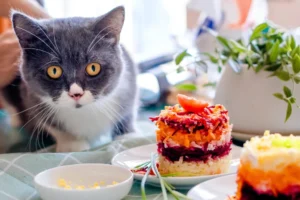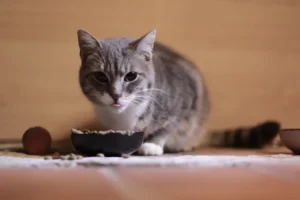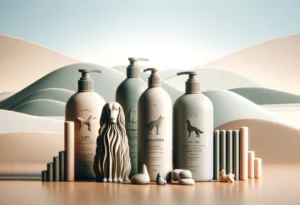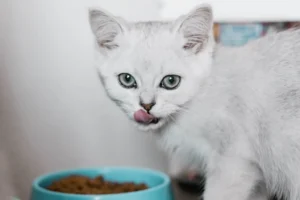Have you ever wondered why cats’ noses are sometimes wet? Let’s explore the reasons behind this common feline phenomenon.
Cats have wet noses for several important reasons, including hydration, thermoregulation, and scent detection. Let’s dive deeper into the fascinating world of cat noses.
Hydration: Why do cats have wet noses?
A cat’s wet nose is not just a random occurrence; it actually serves as a good indicator of their hydration levels and overall health. Just like how our skin can feel dry when we’re dehydrated, a cat’s nose can be a great way to tell if they are drinking enough water. A well-hydrated cat will typically have a cool and moist nose, while a dry nose could indicate that they need more fluids.
Ensuring your cat stays hydrated is crucial for their overall well-being, as water plays a vital role in various bodily functions. By keeping an eye on the moisture of their nose, you can help monitor their hydration levels and take action if needed. If you notice their nose is consistently dry, it might be a good idea to encourage them to drink more water or consult with a veterinarian to rule out any underlying health issues.
Thermoregulation: How do wet noses help cats regulate their body temperature?
Cats are known for their ability to adjust to different temperatures, and their wet noses play a crucial role in helping them regulate their body temperature. During hot weather, a cat’s moist nose can help them cool down by evaporating the moisture on their nose, similar to how humans sweat to cool off.
In addition to assisting with cooling, a cat’s wet nose also helps them maintain a consistent body temperature. When the weather is cold, the moisture on their nose can help retain heat, keeping them comfortable in lower temperatures.
So next time you see your cat with a wet nose, know that it’s not just about hydration but also about thermoregulation. It’s their natural way of keeping themselves comfortable and healthy in various weather conditions.
Scent detection: How does a wet nose help cats with their sense of smell?
Cats have a remarkable sense of smell, and their wet noses play a crucial role in enhancing this ability. A moist nose helps cats trap scent particles in the mucus on their nasal passage, making it easier for them to detect and identify different smells in their surroundings. The moisture on their nose also helps cats determine the direction from which a scent is coming, aiding in their hunting or exploring activities.
Moreover, the wetness on a cat’s nose helps to improve the transfer of scent molecules to special sensory cells in their nasal cavity, which are responsible for interpreting smells. This means that a wet nose is essentially a natural tool that assists cats in navigating and interpreting the world through their keen sense of smell. So, next time you see your feline friend with a wet nose, know that they are just utilizing this amazing tool to sniff out the world around them more effectively.
Sneezing and cleaning: Why do cats lick their wet noses?
Cats are meticulous groomers, and licking their wet noses is just part of their diligent hygiene routine. Licking helps cats keep their noses clean by removing any dirt, debris, or excess mucus that may have accumulated. This self-cleaning behavior not only helps in maintaining a clear nasal passage but also assists in preventing infections or irritations that could arise from a dirty nose.
Additionally, sneezing is another way cats keep their noses clear and healthy. Sneezing helps expel any foreign particles or irritants from their nasal passages, ensuring that their sense of smell remains unobstructed. So, if you notice your cat sneezing or frequently licking their nose, rest assured that they are simply taking care of their essential sense of smell and overall well-being.
- Extra tip: If you observe prolonged or excessive sneezing, nasal discharge, or any other concerning nasal issues in your cat, it’s best to consult with a veterinarian to rule out any underlying health conditions that may require attention.
Dry nose concerns: Should you be worried if your cat has a dry nose?
If your feline friend’s nose is feeling a bit dry, don’t jump to conclusions just yet. It’s actually pretty normal for cats to have a dry nose from time to time. Factors like sleeping in a warm room or spending time in the sun can dry out their nose temporarily. However, if you notice prolonged dryness or other concerning symptoms like nasal discharge, sneezing, or lethargy, it might be time to schedule a vet visit. These could be signs of an underlying health issue such as dehydration, allergies, or an upper respiratory infection.
Remember, a dry nose on its own is not always a cause for alarm, but keeping an eye out for other symptoms is key to ensuring your kitty stays happy and healthy.
Feline anatomy: What makes a cat’s nose different from a human’s?
Cat noses aren’t just cute and boopable – they’re also pretty remarkable in terms of function. Cats have a specialized nasal structure that includes a layer of tissue with a rich blood supply, which helps keep their noses moist. This moisture aids in trapping scent particles, allowing cats to have a heightened sense of smell compared to humans. Additionally, a cat’s nose is lined with scent receptors that help them navigate their environment and communicate with other animals through pheromones.
So, next time you marvel at your cat’s wet nose, remember that it’s not just a quirk of nature – it’s a crucial part of what makes your feline friend such a skilled hunter and a keen explorer.
Additional unique insight: Factors like brachycephalic (short-nosed) breeds, such as Persians or Himalayans, may be prone to having dryer noses due to their unique facial structure. Keeping an eye on their nose moisture levels and consulting with a vet if needed can help ensure their overall well-being.
Interesting facts: Fun trivia about cat noses
Did you know that a cat’s wet nose is a result of a thin layer of mucus covering it? This mucus helps cats absorb scent chemicals in the air, enhancing their sense of smell. Additionally, cats lick their noses to keep them clean and moist, aiding in their olfactory abilities. Next time you see your feline friend with a wet nose, remember it’s all part of their incredible sensory system at work!
Common misconceptions: Debunking myths about cat noses
Contrary to popular belief, a wet nose on a cat does not always indicate illness. While a dry nose can sometimes signal a health issue, a wet nose is often just a sign of a hydrated and healthy cat. So, don’t let a moist nose alarm you – it’s usually a good sign! Remember that each cat is unique, and their nose moisture levels can vary based on factors like environment, age, and individual differences.
Alex, a passionate animal lover, has experience in training and understanding animal behavior. As a proud pet parent to two dogs and three cats, he founded AnimalReport.net to share insights from animal experts and expand his knowledge of the animal kingdom.




